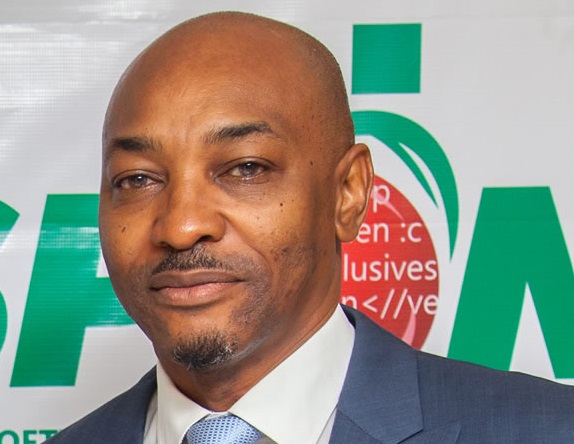Telecom
Mba-Uzoukwu, ISPON President Decries 30% Utilisation Rate of 11 Datacenters in Nigeria

Mr. Chinenye Mba-Uzoukwu, president, Institute of Software Practitioners Association of Nigeria (ISPON) has decried the under utilisation of the 11 data centres in Nigeria, putting the current utilisation rate at below 30%.

He noted that the low adoption indicated that despite the forecasted growth in installed capacity, the patronage by way of utilisation does not match the expected levels.
He made this known while speaking at a Technology Forum organized by the Nigerian Information Technology Reporters Association (NITRA) in Lagos, with the theme: “Achieving 30% Growth In Local Cloud Hosting By 2024”.
According to Mba-Uzoukwu, “we are faced with a puzzling question: the housing estates that our friends are building against all odds in a super-challenging environment, will they be occupied by offshore tenants or ourselves?”
“There are 11 datacenters in Nigeria and the largest are expanding their capacity constantly in anticipation of a growing demand but currently the utilisation of capacity probably sits at below 30%.
“With four certified Tier 3 Constructed Facilities in Nigeria and more on the way, the Africa datacenter market is expected to cross $3bn by 2025, growing at a CAGR over 12%.
“This indicates that despite the forecasted growth in installed capacity, the patronage by way of utilisation does not match the expected levels”.
Unformed report also indicates that Galaxy Backbone Limited which is the only Uptime Institute Certified Tier 3 Datacenter in the public sector (in Nigeria) is currently estimated at 38% capacity utilisation of its 2.5MW capacity.
To this end, the President of ISPON said, “We must ask why”.
“The 2020 GSMA report highlights that availability of internet services has not translated to adoption while there is no established correlation between broadband availability and indicators of innovation such as hubs and software companies e.g. Aba, Enugu, Calabar, Benin and Jos have limited broadband and predominantly 2.5G/3G networks yet host significant innovation activity.
“ISPON’s research indicates that this puzzling scenario is directly related to local software – local in the sense of being developed by Nigerians for Nigerians to solve Nigerian problems.
“While we have seen phenomenal growth in the fintech space, the vector and velocity for the evolution of Software Nigeria as a whole remains constrained by the extent to which the Digital Economy which is emerging is anchored on local innovation and local utilisation.
“The datacenters performance is driven by users are large corporates and MNCs for whom data services are not taken lightly as they commit to long-term relationships on the basis of reliability especially High Availability which is indexed to global standards. In this context, Digital Transformation, especially in the public sector is critical pre-requisite.
“Digital Transformation delivers joined-up government that enables the policy and process of governance to ride on top of IT infrastructure from broadband to software solution stacks. It also presents opportunities for entrepreneurship and innovation to flourish as solution providers get work to do. For this dynamic to be accelerated and proliferated, it is difficult to over-estimate or emphasise the importance of the Local Cloud which must be the initial point of access for a broad-based digital adoption and transformation strategy in a rising tide that lifts all.
“We often fail to recognise and prioritize this fundamental – perhaps it is an inconvenient truth?
“There is much to unpack in this but it will suffice to say that ISPON believes that the Software Nigeria and Data Nigeria are conjoined twins – separating the two is not only difficult but in this case, it is foolhardy because what we share is vital to the survival of each twin. Let us therefore proceed with this in mind!”
He also applauded NITRA for hosting the event, adding that ISPON sees the Association as an integral component of the technology ecosystem as partners as well as practitioners whose largely unsung efforts have been pivotal to the emergence of the industry we celebrate today as Africa’s most vibrant and fastest evolving technology ecosystem.
“ISPON celebrates you, one and all!
“We are therefore extremely pleased to be a part of this celebration and the discussions that follow will be one more block laid by NITRA in the tremendous role being played by your Association and members in the growth of the Digital Economy.
“We thank you for what you do and once again, give our assurances of a continued partnership.
Chike Onwuegbuchi, Chairman of Nigeria Information Technology Reporters’ Association (NITRA), said that the theme was carefully selected to enable stakeholders in the information and Communications Technology to discuss issues that will bring growth and development to the sector.
“This edition”, he said, “we are looking at local cloud hosting a very important aspect of technological development.
“Cloud computing has been described as the greatest game changer since the creation of the internet and is one of the fastest growing areas of technology today. It can be simply defined as renting time on a computing infrastructure over the internet, rather than building your own from the ground up. In a way, it could be described as outsourcing your computer infrastructure.
“Cloud computing offers scalability and reliability that cannot be matched by a single enterprise.
“Today, we are talking of data protection. How can you protect data that is warehoused outside of our shores?
“Local cloud hosting also helps to keep our local internet traffic local as local content providers host their content in-country.
He also recalled that NITDA in 2019 launched Nigeria’s Cloud computing policy and one of the goals of this Policy is to ensure a 30% increase in adoption of cloud computing by 2024 among Federal Public Institutions (FPIs) and SMEs that provide digital-enabled services to the government.
“The policy also targets 35% growth in cloud computing investments by 2024. It is on this that we selected the theme of today’s event.
“When we are talking about local cloud hosting we can’t achieve it if we don’t patronize local datacenters; this informed the presences of datacentre operators in this discourse.
The Forum attracted industry stakeholders including corporate organisations; Nigeria Internet Registration Association (NiRA); Internet Exchange Point of Nigeria (IXPN); Cloudflex; Layer3; Vintage Confluence LLC and industry associations – ISPON, ALTON, ATCON, NCS, amongst others.
Telecom
MTN Says New N6.98 USSD Charge Won’t Affect Airtime Recharge

Lynda Saint-Nwafor, chief Enterprise business officer, MTN Nigeria, has assured the network subscribers that the new end-user billing system for the use of USSD services will jot affect them.

USSD, otherwise Unstructured Supplementary Service Data codes are commonly used for banking transactions, airtime recharges, and other mobile services.
The telco said that there is no significant impact or change other than the fact that they will now pay the same N6.98 per session (120 seconds) with their airtime instead of direct bank debit.
Saint-Nwafor, said this during a chat with MTN MIP fellows, explaining that the Central Bank of Nigeria (CBN) and the Nigerian Communications Commission (NCC) have ordered telecom operators to ensure that the new billing model resolves trust issues and ensures transparency in the billing process.
“Our regulator insisted that at the end of every month, we are going to be providing history and statistics on the performance of the service across the board”, she explained.
Saint-Nwafor added that the new billing model has standardized messaging across all operators and ensures consistent communication with customers.
“We will take all the error codes and map them into messages that are standardised across the board. So, if you initiate a transaction, you will know if it is failing. And, when the transaction fails, you will know if it is from your bank or the telco,” she explained.
Telecom
Crypto Scam Unmasked: U.S. Recovers Record $225m in Global Fraud Bust

The U.S. government has recovered $225 million in what is now the largest seizure of funds linked to a cryptocurrency investment scam.

In a statement released Wednesday, June 18, the U.S. Attorney’s Office said the recovery followed an extensive investigation by the FBI and the U.S. Secret Service, using blockchain analysis and other forensic tools. The statement did not confirm whether any arrests had been made.
According to the authorities, the stolen funds originated from fraudulent cryptocurrency investment schemes that tricked victims into believing they were making legitimate investments. More than 400 individuals around the world, including dozens in the United States, were reportedly affected.
The operation involved a sophisticated money laundering network that carried out hundreds of thousands of blockchain transactions to obscure the source and ownership of the stolen assets.
“These scams prey on trust, often resulting in extreme financial hardship for the victims,” said Shawn Bradstreet, Special Agent in Charge at the U.S. Secret Service office in San Francisco.
Bradstreet added that U.S. officials hope the recovered funds can eventually be returned to the rightful victims.
Cryptocurrency investment fraud accounted for over $5.8 billion in reported losses in 2024 alone, according to the statement.
Telecom
Nnaemeka Ani Calls on African Techies to Rewrite the Narrative

In a rousing declaration that is electrifying minds across the continent, Hon. Nnaemeka Ani, Special Adviser on ICT to Enugu State Governor, Dr. Peter Mbah, has called for a homegrown digital revolution under the banner “Africa Will Rise: By Code, By Courage, By Us.”

Hon. Nnaemeka Ani
The message, part challenge, part philosophical—seeks to galvanize African innovators to move beyond buzzwords and build technology with impact and legacy in mind.
“Let’s stop building for hype. Let’s start building for legacy,” Ani urged while speaking to ICT journalists over the weekend. “Let’s stop waiting for someone else. Let’s start creating the future—on our own terms.”
At the heart of Ani’s vision is a shift from tech consumerism to tech authorship. With innovation hubs sprouting across cities like Enugu, Lagos, Kigali, Jo’Burg, and Nairobi, and a growing community of developers, engineers, and entrepreneurs determined to solve Africa’s unique challenges, the movement is already taking shape.
Ani emphasized that Africa’s future lies not in flashy apps or international admiration but in persistent, intentional solutions that uplift communities—solutions that digitize public services, bridge rural-urban divides, empower women and youth, and build resilience in food and climate systems.
“We have the talent,” he said. “Now it’s time to harness it—to stop building for likes and start building for lasting impact.”
With support from leaders like Ani and rising momentum in Africa’s tech corridors, it seems that a new chapter is being written—one line of code at a time.

 General News3 days ago
General News3 days agoNASRDA, Galaxy Space Firm Sign MoU on Satellite Connectivity

 Telecom3 days ago
Telecom3 days agoOver 1m Nigerians Reached through MTN Staff’s Digital and Community Outreach

 Telecom3 days ago
Telecom3 days agoMafab Gets 0724 Number Series, Launches Mcom 5G Brand

 News3 days ago
News3 days agoDBN Awards N13m in Grants to Tech Startups

 Telecom3 days ago
Telecom3 days agoNCC to Name, Shame Telecom Infrastructure Vandals

 News3 days ago
News3 days agoFCCPC Shuts France, Belgium, and Italy Visa Centres in Abuja Over Alleged Consumer Rights Violations

 Telecom3 days ago
Telecom3 days agoWSIS Review: Nigerian ICT Leaders Urged to Shape Global Digital Future

 E-Financial3 days ago
E-Financial3 days agoBank Customers Petition CBN over Illegal Deductions, Demand Action




























